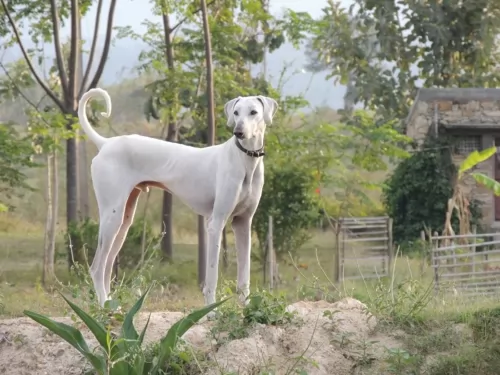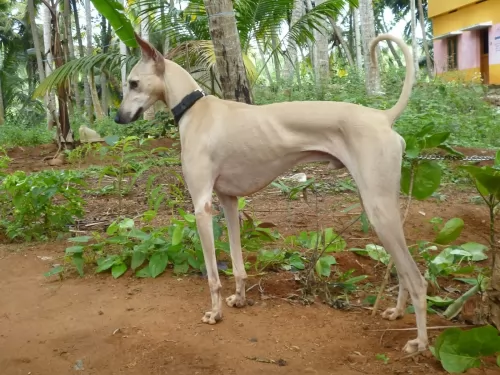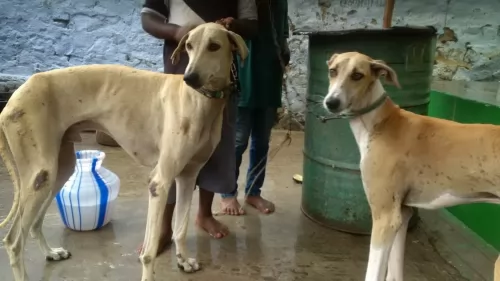 Petzlover
Petzlover Bavarian Mountain Hound is originated from Germany but Chippiparai is originated from India. Bavarian Mountain Hound may grow 11 cm / 4 inches shorter than Chippiparai. Both Bavarian Mountain Hound and Chippiparai are having almost same weight. Both Bavarian Mountain Hound and Chippiparai has almost same life span. Bavarian Mountain Hound may have more litter size than Chippiparai. Bavarian Mountain Hound requires Moderate Maintenance. But Chippiparai requires Low Maintenance
Bavarian Mountain Hound is originated from Germany but Chippiparai is originated from India. Bavarian Mountain Hound may grow 11 cm / 4 inches shorter than Chippiparai. Both Bavarian Mountain Hound and Chippiparai are having almost same weight. Both Bavarian Mountain Hound and Chippiparai has almost same life span. Bavarian Mountain Hound may have more litter size than Chippiparai. Bavarian Mountain Hound requires Moderate Maintenance. But Chippiparai requires Low Maintenance
 The Bavarian Mountain Hound was originally bred mixing the Bavarian Hound and the Hanover Hound. They decided to mix these breeds in a hope that the new breed will have the best of the parents. Actually, it turned out better than they could even imagine, since they created a great family dog, with magnificent stamina, quiet temperament and supersensitive nose that made them great hunters.
The Bavarian Mountain Hound was originally bred mixing the Bavarian Hound and the Hanover Hound. They decided to mix these breeds in a hope that the new breed will have the best of the parents. Actually, it turned out better than they could even imagine, since they created a great family dog, with magnificent stamina, quiet temperament and supersensitive nose that made them great hunters.
 The Chippiparai is a working dog found in India and until recently there has been little interest in the purity of any breed, but rather only an emphasis on the abilities of the dog. They are only beginning to research the origin and history of their native dogs such as the Chippiparai. Not much is known about the origin of the breed except that it is found almost exclusively in Tamil Nadu and Keraia in the southern part of the subcontinent of India. Other than this there is much speculation about the breed’s origin but very little-known facts. It is indeed an ancient breed; however, its origin could be thousands of years ago or simply hundreds of years ago.
The Chippiparai is a working dog found in India and until recently there has been little interest in the purity of any breed, but rather only an emphasis on the abilities of the dog. They are only beginning to research the origin and history of their native dogs such as the Chippiparai. Not much is known about the origin of the breed except that it is found almost exclusively in Tamil Nadu and Keraia in the southern part of the subcontinent of India. Other than this there is much speculation about the breed’s origin but very little-known facts. It is indeed an ancient breed; however, its origin could be thousands of years ago or simply hundreds of years ago.
• Perhaps it is a descendant of the Saluki as it resembles this breed quite a bit. It has been believed for some time that the Saluki is the original sighthound and the source of all sighthound breeds. The Saluki was very popular in the Middle East, especially in Persia and Arabia from which it could easily have spread to India. It would then have been shared from Northern India to Southern India where the Chippiparai is found.
• Perhaps the Chippiparai is a descendent of sighthounds from Central Asia and Afghanistan – the Tazi, Taigan, Hortaya Borsaya or the Afghan Hound. This part of Central Asia had more trade, influence and contact with the Indian subcontinent early in their history than with any other region. The Chippiparai is considered by some to be more like these sighthounds than like the Saluki and the interaction between these regions has a much longer history than the Middle East and India.
• It is also speculated that the Chippiparai might have been developed completely and uniquely from the local street and working dogs. With the civilization of India being one of the oldest in the world, it is considered a possibility that the Chippiparai is the descendent of the Harappan hunting dogs that probably were developed by the Indus Valley or Harappa roiling class.
Wherever the Chippiparai came from, they were the exclusive property of the wealthy and ruling castes. These upper castes were the only ones that could legally hunt with dogs or afford to feed one. The royal classes of Tiruneivell, Thanjavur, and Madurai all fed the popularity of the breed among the upper castes. They were coursing dogs used to chase down the prey once it was sighted. The Chippiparai are incredibly fast runners and would catch almost any prey and either hold it or kill it for their hunter. The Chippiparai, when not hunting, had to be chained so they would not chase any small animal that they saw. This confinement also added to the purity of the breed as random breeding was prevented.
The southern part of the Indian subcontinent is extremely hot with routine temperatures over 100’. The Chippiparai was developed to withstand these extreme temperatures and is more heat tolerant than most any other breed. They also need very little food and are resistant to the many parasites and diseases found in southern India.
Harboring the belief that Indian dogs were not as good as European ones, the occupying countries of Portugal, France, and Britain, had no interest in the Chippiparai, again leaving the breed to develop naturally on their own with little or no interbreeding. They also received no formal recognition because Indian culture only valued the dog for its working abilities. There was no Indian Kennel Club until 1956.
The Chippiparai is now very rarely and only found in the area of its birth. Many believe the breed is in danger of becoming extinct and even though it is now registered with Indian Kennel Clubs it is not often shown in their dog shows. Lovers of the breed are now attempting to get Indians to recognize that the Chippiparai is a great companion animal and attempting to save the breed.
 The Bavarian Mountain Hound is a medium sized breed of a dog. They have larger bones, but there is a very low risk of obesity. This is a very active dog, with a very muscular body. Their bone structure defines in a wide chest, and their back legs set a little bit higher than the front legs. They have strong necks and pear-shaped heads. They have strong jaws, ideal for a hunting dog. They are very specific because of their big brown eyes. The Bavarian Mountain Hound is a perfect pet. First of all, he is not a pack dog. He gets attached to his family and he is not very friendly with strangers. If they are trained well, they will never attack a stranger but they will bark and let you know that something isn’t right.
The Bavarian Mountain Hound is a medium sized breed of a dog. They have larger bones, but there is a very low risk of obesity. This is a very active dog, with a very muscular body. Their bone structure defines in a wide chest, and their back legs set a little bit higher than the front legs. They have strong necks and pear-shaped heads. They have strong jaws, ideal for a hunting dog. They are very specific because of their big brown eyes. The Bavarian Mountain Hound is a perfect pet. First of all, he is not a pack dog. He gets attached to his family and he is not very friendly with strangers. If they are trained well, they will never attack a stranger but they will bark and let you know that something isn’t right.
 The Chippiparai is a typical sighthound although their size and appearance will vary more than that of registered purebred sighthounds. Typically, they will have a long, domed head with small erect ears and dark eyes. Their muzzle will be as deep and wide as the skull but longer. Their legs are straight and long, their chest is roached back and deep, giving them, an appearance very similar to a greyhound or other sighthound.
The Chippiparai is a typical sighthound although their size and appearance will vary more than that of registered purebred sighthounds. Typically, they will have a long, domed head with small erect ears and dark eyes. Their muzzle will be as deep and wide as the skull but longer. Their legs are straight and long, their chest is roached back and deep, giving them, an appearance very similar to a greyhound or other sighthound.
They have a long curly tail, and their coat can vary greatly in color. They are medium sized, and their coat is short, shiny and close. He is very slender and sleek, which along with his long legs gives him that incredible speed. They are thin with visible ribs.
 Special talents: Since the Bavarian Mountain Hound is born with a strong scent, they are great for hunting. They can be trained to be search dogs.
Special talents: Since the Bavarian Mountain Hound is born with a strong scent, they are great for hunting. They can be trained to be search dogs.
If you live slow and quiet life indoors, maybe the Bavarian Mountain Hound is not the best choice for you. They are a calm breed, they do not bark a lot, but they need daily outdoor activity. They usually get attached to the owner, but in case you raise this dog in a family, they will be attached to adults and the children. They are very good while playing and living with the children, but if you usually have a lot of other children or strangers in a house, he will adapt to that kind of social life very easy.
It is very important that you start an early socialization of your Bavarian Mountain Hound. In situations where you raise this breed without the social life, they will have difficulties when they find themselves in situations with other animals. If you raise this breed with other animals in the same home, they will learn to play with other dogs, cats etc.
Bavarian Mountain Hound is not easy to train because they get easy distracted with smelling something more interesting than listening to your commands. It is not advised to have this breed as your first pet because they need an experienced trainer with a lot of patience and understanding.
 The Chippiparai is a loving, gentle family dog if well socialized, well trained and well exercised. They are very intelligent and need human companionship. Once they are living with a human family, they are very protective of that family. They are for the most part peaceful and quiet dogs. They are loyal and loving but they are not overly affectionate. Cuddlers they are not, and they do not like to play rough with children.
The Chippiparai is a loving, gentle family dog if well socialized, well trained and well exercised. They are very intelligent and need human companionship. Once they are living with a human family, they are very protective of that family. They are for the most part peaceful and quiet dogs. They are loyal and loving but they are not overly affectionate. Cuddlers they are not, and they do not like to play rough with children.
Accepting and loving within the family, the Chippiparai are equally hesitant and shy around strangers. They can be suspicious, but they are not aggressive. They are just very aloof with strangers, yet they hardly ever bark.
 The Bavarian Mountain Hound is a quiet type of the dog. They don’t ask for a lot of attention and even if they develop some health issues you will have a hard time finding it out. So, the regular vet checks are a necessity. They usually suffer from an ear infection. The vet will usually check for a hip or an elbow dysplasia since those diseases occur with highly active breeds. Some irritations with eyelids are also found in the medical history of this breed but they are generally very rare.
The Bavarian Mountain Hound is a quiet type of the dog. They don’t ask for a lot of attention and even if they develop some health issues you will have a hard time finding it out. So, the regular vet checks are a necessity. They usually suffer from an ear infection. The vet will usually check for a hip or an elbow dysplasia since those diseases occur with highly active breeds. Some irritations with eyelids are also found in the medical history of this breed but they are generally very rare.
 There are no clinical studies regarding the health and health history of the Chippiparai, so little is known about their long-term health. However, most who know the breed, believe it is an incredibly healthy one. They seem to have a lot less genetically transmitted health issues than other purebreds. Because of their isolation for centuries in India, they have developed immunities and resistance to most parasites and diseases other dog suffer from.
There are no clinical studies regarding the health and health history of the Chippiparai, so little is known about their long-term health. However, most who know the breed, believe it is an incredibly healthy one. They seem to have a lot less genetically transmitted health issues than other purebreds. Because of their isolation for centuries in India, they have developed immunities and resistance to most parasites and diseases other dog suffer from.
Because of this you should look for the types of issues that occur in dogs of this size and build. Have them tested by the Canine Eye Registration Foundation and the Orthopedic Foundation for Animals.
 There is a big difference in feeding the Bavarian Mountain Hound since you can raise him to be a pet or a dog for hunting. If you decided to keep this breed as a pet, they will do just fine with one of the dry foods that are good quality. If you want to raise them as a hunting dog, an active dog, then they will need a high-quality dry food and occasionally some raw minced meat.
There is a big difference in feeding the Bavarian Mountain Hound since you can raise him to be a pet or a dog for hunting. If you decided to keep this breed as a pet, they will do just fine with one of the dry foods that are good quality. If you want to raise them as a hunting dog, an active dog, then they will need a high-quality dry food and occasionally some raw minced meat.
High-quality food for puppies with a lot of nutrients that will help in growing the healthy bones and beautiful coat.
Since they have a short coat, the Bavarian Mountain Hounds don’t need a regular or any special kind of grooming. They will do just fine with occasional brushing. They don’t shed a lot, but in a season when they do you are free to brush them more regularly. They enjoy the brushings, cuddles, scratching, belly rubs - they are very lovable breed. But, as advised, take them to regular vet check because they can be very quiet even when they feel the pain.
The Bavarian Mountain Hound has a gene of a working dog and that is the reason why they need a lot of the activity on a daily basis. No matter if you take him to walk, run or a bike ride, they will love it. They do not like being on the leash since they love to use their nose to play. If you socialise them well, the dog park will be a great thing for them.
 Do not overfeed your Chippiparai. Feed twice a day and no more than a total of 2.5 cups of high quality dry food.
Do not overfeed your Chippiparai. Feed twice a day and no more than a total of 2.5 cups of high quality dry food.
As mentioned previously the Chippiparai seems to have no genetic diseases or issues and very few acquired ones. However, he is sensitive to anesthesia and some foods. He is intolerant to cold weather and has a hard time with his pads on hard surfaces. Some Chippiparai might experience some of the ailments other breeds like them experience.
Both Elbow and hip are possible. This can cause arthritis and lameness. This occurs when the bone does not fit well into the joint.
This can cause lameness as well. The kneecaps slide over the knee instead of staying in place.
This is a hunting dog and he will want to hunt. They are incredibly fast and need the opportunity to run. Brisk walks will not be enough for this dog. He is very energetic. They will chase any small animals. It is not recommended that you have small pets even small dogs or cats with a Chippiparai. Having been bred for centuries to hunt, they are not likely to respond to any commands if they are off lease and chasing prey. Do not allow them to be off leash unless in a fenced area, and that fence needs to be 8 feet tall as they can easily jump a seven-foot fence. Try they at coursing, agility, fly ball and frisbee competitions.